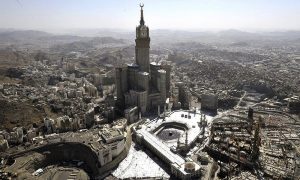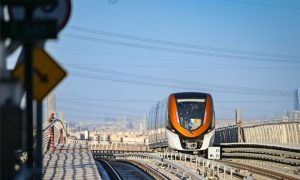Overcoming Fears
Big Project ME talks a number of master developers in Dubai to find out how the real estate market is going to change in the wake of the awarding of Expo 2020. Gavin Davids reports


Master developers in Dubai say that it’s time for the Dubai real estate market to overcome its ‘fear psychosis’ .
Prior to the announcement that Dubai would be the host city of the World Expo in 2020, the common consensus was that the city’s real estate market would see a significant upswing in terms of valuation and pricing.
While it can be argued that this was always going to be the case, with the market already climbing back up after the collapse in 2008, it’s equally difficult not to say that the Expo will have a major impact on the market.
With hundreds of thousands of jobs expected to be created over the course of the next seven years, across all walks of life, there are going to be a lot of people in Dubai flush with cash and looking to spend it. This obviously hasn’t gone unnoticed, and already the rumours and whispers about rent increases and property prices have begun. So prevalent were these concerns, the International Monetary Fund (IMF) was compelled to issue a statement warning Dubai’s government to make sure its property market is being driven by ‘fundamental factors’ and not speculation.
“When you begin to see very rapid increases in any asset prices, then you just need to be prepared to act,” says Masood Ahmed, the IMF’s director for the Middle East and North Africa.
With housing prices in the emirate jumping by more than 20% over the last year, perhaps the IMF is right to warn of the risk of another ‘property bubble’ being formed.
Further compounding fears after the Expo announcement was that the massive megaprojects being planned and announced would cause prices to be raised as landlords and developers took advantage of the rekindled interested in the market.
Therefore, Big Project ME thought it would be interesting to hear from master developers themselves to find out how they view the situation and how they intend to react to it.
Kabir Mulchandani, the CEO of SKAI Holdings, is a man who has seen it all, having faced allegations of fraud at the height of the collapse, to rebuilding his empire with mega property deals worth more than $1 billion. His latest venture is the $1 billion Viceroy Dubai Palm Jumeirah.
He tells Big Project ME that what’s happening with the property market isn’t so much a revival as it is a natural correction.
“Obviously there are many reasons that contributed to the revival, but let’s start with where the problems were. We all talk about the crisis in 2008, but just as the boom was excessive, the fall was also excessive. Prices fell far below fair value because of the psychology of fear. Just as greed tends to add irrational exuberance, the excessive fear caused an excessive depression of prices,” he explains. “I think, between 2010, 2011 and the growth in 2012, the market once again found its feet when people got out of the fear psychosis and we moved towards fair value.”
It’s an interesting school of thought, and one that real estate agents appear to agree with. According to a Cluttons report, the buoyancy in Dubai’s residential market persisted through the third quarter of this year, with average capital values rising by 8%, following on from the record 23% growth in values in the second quarter.
The latest increase leaves values 25.7% below the Q3 2008 market peak, 47.6% above the bottom of the market in Q2 2009 and 52.3% higher than this time last year.
Meanwhile, the emirate’s rental market has also continued to record positive growth, albeit at a slower pace than that experienced during Q2. In Q3, average residential rental values rose by 3%, following on from the 8.2% increase in Q2.
“Looking forward to the end of the year, with Dubai winning the rights to host the World Expo in 2020, we expect to see heightened investor interest as Dubai’s real estate recovery drives further inward investment, particularly from the GCC region and broader Middle East,” the report explains.
“We have already seen this trend materialise in the results of our 2013/14 International Private Capital Survey, with HNWI from Manama and Muscat favouring Dubai over London as a primary global real estate investment destination.”
Mat Green, head of research and consultancy for the UAE at CBRE Middle East, points out that the last edition of the Expo, held in 2010 in Shanghai, attracted around 73 million visitors, a record for the event.
“The USA pavilion alone attracted over 7.3 million visitors during the six month period, more than Dubai’s total hotel guests during the whole of 2007,” he says in a CBRE report.
“However, according to Chinese Government figures the vast majority of visitors to the Expo event were Chinese nationals, with only roughly 6% of the estimated 73 million visitors were actually foreign tourists.
“Whilst this is still a significant number of visitors, it does suggest a need for caution in respect of Dubai’s future development plans which must remain anchored to actual supply and demand dynamics, rather than building just for a single event,” he warns.
Mulchandani adds that while Dubai’s growth has been compounded by the UAE recovering as a whole from the slump, he says that a lot it can be attributed to a natural recovery.
“As I said, in some point in 2012, we reach fair value. Now the growth has come in because of the general optimism in the UAE. The real economy, the other sectors besides real estate, are seeing a massive recovery across the board. That’s lead to the recovery in the last one year,” he explains.
“(The Expo) is going to have an impact. It’ll have a real impact on the economy. On a conservative estimate it will create 250,000 fresh jobs. People are optimistically talking about even a half a million jobs or 750,000 jobs.
“Those jobs will lead to demand for residential units, office space, all of that will come in. So there will be a real benefit. I think of course that this will lead to some speculation as the market will have a bump, just on the announcement of the Expo itself.”
This concern over speculation is a common worry amongst real estate experts. However, Yousuf Kazim, the general manager of Jumeirah Golf Estates, another master planned development in Dubai, says that he’s seen a shift in the way investors and the government are approaching projects, which will alter the way developers will be doing business.
“I looked into this market a long time and I’ve seen all the cycles. I believe that with RERA and the regulations that have been put in by the Land Department, it’s now really well regulated. The market is now more mature, the customers are more mature, the developers and the sub-developers, they’re all more mature.”
“Look at this market when it was premature, you had a lot of speculators, a lot of risk elements. Today, the whole situation is different. There’s more reality, more realisation of the project. It’s definitely a win-win for the developer, it’s a win for the customer. It’s even a win for the master developer,” he asserts.
“I believe that RERA is doing a great job, and by having a regulated real estate market in Dubai, that will put us in a very good position, and I believe that this is a very important and crucial element in Dubai’s success.”







